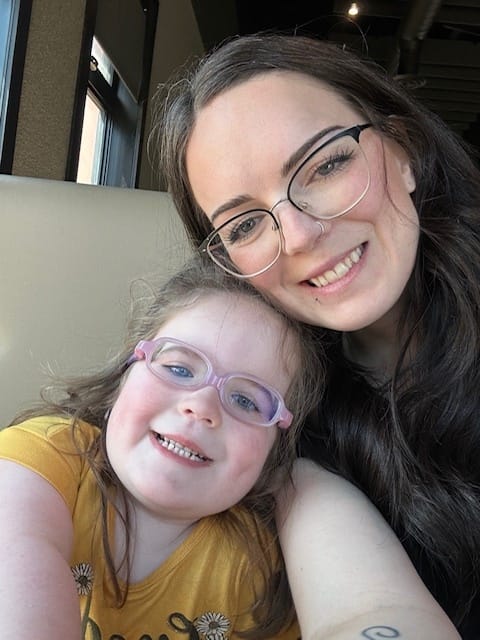
Now three, Eilidh, left, has worked with physical, occupational, and speech therapists to help her development. // Submitted
Every mother expects to bring their baby home after birth, and it’s a scary time when they cannot.
As doctors and nurses ask questions, do tests, and continuously examine the baby, parents wait for an answer.
Shanlee Hynes’ first-born, her son Kohlson, gave her all the typical experiences she expected at birth. However, her second-born, daughter Eilidh, was different.
“We noticed right away that she was having some troubles latching on and feeding, but they acquainted it with a traumatic birth because she came really fast,” Hynes says.
Although Hynes and her husband, Conor, thought things would get better through the night, Eilidh was still having trouble.
After their daughter was born at High River General Hospital, the family had to move to the Alberta Children’s Hospital for testing to determine what was different about Eilidh. After a week there, Eilidh was transferred to the South Health Campus for more tests, including genetic testing, for three weeks.
Sent home without a diagnosis, the Hynes family received Eilidh’s results three months later: Prader-Willi Syndrome (PWS).
“We never had heard of it before,” Hynes says. “We had to go through a lot of research to figure out what it meant for our family.”
Adjustments
For the first year of Eilidh’s life, Hynes says her daughter wasn’t able to do much. Eilidh had to be fed through a nasogastric tube as she still wouldn’t latch. However, at 10 months old, she finally took a bottle.
“All of her developmental milestones are delayed,” Hynes says. “They’ve taken double the amount of time that it would take a [typical] child to do.”
After raising one child, Hynes had to relearn the process and adjust to what works best for Eilidh.
Now three, Eilidh has worked with physical, occupational, and speech therapists to help her development while Hynes has learned to navigate hospitals, therapies, and appointments.
Prader-Willi Syndrome
PWS is a rare genetic disorder that affects one in 15,000.
The disorder affects the growth and development of a child, physically and emotionally, and can cause behaviour issues like anger and compulsion. Physically, people with PWS tend to be short with small hands and feet.
The most major and scariest symptom is hyperphagia, or insatiable hunger. Out of fear they could eat themselves to death, pantries and fridges need to be locked and the garbage needs to be taken out every night.
Eilidh’s journey with the condition is still uncertain as she doesn’t display any of the scarier symptoms. PWS is a spectrum disorder, so at three-and-a-half years old, the family doesn’t know how badly she will be affected.
The only available treatment
Hynes says the only available treatment for PWS is a daily growth hormone injection. This injection aids in development but does not stop any of the symptoms. Studies are being performed on treatments to curb the hyperphagia, but none have been approved.
Currently, Eilidh does not take the growth hormone because she has sleep apnea and will need a CPAP machine before her doctors will consider giving her the injections. However, getting a three-year-old to use a CPAP machine is not easy.
“That’s where we’re currently at, and especially going through COVID, we are so delayed in getting any sort of medical treatment for her because the hospitals were just so backed up,” Hynes says.
Eilidh had to wait six months for a sleep study, and afterwards they had to wait for a CPAP machine. However, when Eilidh is prescribed growth hormones, the Hynes family will need to pay out of pocket.
Not considered a treatment
Growth hormones are not covered by the Canadian government, which does not consider them a treatment for PWS.
Hynes says that Ontario considers growth hormones to be a treatment for the syndrome, however, it is the only province to do so.
Additionally, the public is generally unaware of PWS, so there is minimal drive or funding to make any changes.
“If more people knew about it, then everything else would start to follow,” Hynes says. Whether that be more studies, treatments, or government pushback.
A walk for awareness
One Small Step is an annual walk to raise awareness and funds for the Foundation for Prader-Willi Research Canada. It draws families from around Calgary that are affected by PWS.
“We just walk around Edworthy Park… and put ourselves out there and hopefully it helps people ask questions,” Hynes says.
Hynes believes past walks drew about 30 to 50 people, but she hopes word will spread and they can draw a bigger crowd in order to educate more people about the condition.
The One Small Step walk will take place on Sept. 17 at 10am. Hynes hopes others will join them as they lead the walk through Edworthy Park.
Although this will be the first walk Hynes and her family have been able to participate in, she’s proud to be a part of the PWS community.
“My daughter is the kindest, sweetest person I've ever known, and she is so quick to forgive people and she loves everybody,” Hynes says. “It's not fun to have a kid with a medical diagnosis, but there's so much good that comes out of it as well. She's just the light of our lives and I wouldn't change her for the world.”

